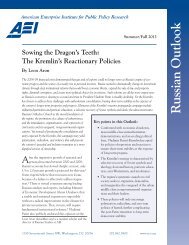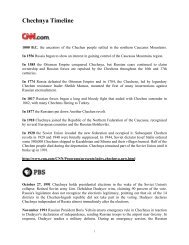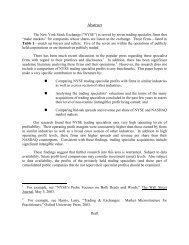Download the PDF - American Enterprise Institute
Download the PDF - American Enterprise Institute
Download the PDF - American Enterprise Institute
You also want an ePaper? Increase the reach of your titles
YUMPU automatically turns print PDFs into web optimized ePapers that Google loves.
18 SLAVERY AND THE CONSTITUTIONAL CONVENTION<br />
certain sort—not <strong>the</strong> endorsement of slavery as <strong>the</strong> Neo-Garrisonians<br />
have it nor <strong>the</strong> rejection that <strong>the</strong> Neo-Lincolnians say—but an<br />
acceptance of <strong>the</strong> principle that, in a federal system, it is a matter up<br />
to <strong>the</strong> states. It is an acceptance only of a certain sort, though, and<br />
<strong>the</strong> embarrassed circumlocutions in <strong>the</strong> text, <strong>the</strong> frequent denunciations<br />
of slavery as unjust—inside and outside of <strong>the</strong> Convention—<br />
show that this was not an acceptance of slavery in <strong>the</strong> states as a<br />
matter of official indifference or neutrality with regard to it. So, to<br />
give a sampling of that view, Lu<strong>the</strong>r Martin of <strong>the</strong> slave state Maryland<br />
called for abolishing <strong>the</strong> slave trade because it was “inconsistent<br />
with <strong>the</strong> principles of <strong>the</strong> revolution.” 8 That, I think, was a<br />
fairly widely held view. Slavery is accepted as a state institution but,<br />
at <strong>the</strong> same time, regarded as an anomaly and as incompatible with<br />
<strong>the</strong> principles of right endorsed in <strong>the</strong> revolution and after.<br />
None<strong>the</strong>less, <strong>the</strong> Constitution did little about this incompatibility. It<br />
in effect defers, postpones, or displaces any decision for later and<br />
elsewhere. The Founding generation acted in <strong>the</strong> hope that somehow<br />
<strong>the</strong> issue would be taken care of in <strong>the</strong> future.<br />
My point is that <strong>the</strong> way in which slavery was treated in <strong>the</strong> Constitution<br />
was inevitable, or at least nearly so, when we understand<br />
what <strong>the</strong> Founders were doing as <strong>the</strong>y understood it. The first and<br />
really central point is this: in making a constitution, <strong>the</strong>y were making<br />
a federation and not a nation—<strong>the</strong>y were making a union of<br />
o<strong>the</strong>rwise independent states for certain very important but still<br />
limited purposes. The internal ordering of <strong>the</strong> members of <strong>the</strong> federation<br />
was not one of <strong>the</strong> accepted purposes of such unions, and<br />
hardly anyone in 1787 thought that was what was at stake in making<br />
<strong>the</strong> Constitution. Almost no one thought that <strong>the</strong> Convention or<br />
<strong>the</strong> union it was making had <strong>the</strong> power, right, or responsibility to<br />
settle questions of <strong>the</strong> internal ordering of <strong>the</strong> member states. Abraham<br />
Baldwin of Georgia made <strong>the</strong> point when he intervened in <strong>the</strong><br />
discussion of <strong>the</strong> slave trade and said he thought that “national<br />
objects alone are to be before <strong>the</strong> Convention, not [matters] such as<br />
[slavery, which] were of a local nature.” 9 That in itself made <strong>the</strong> rest<br />
more or less inevitable.<br />
But <strong>the</strong>re was more to it than that, actually, and that more






